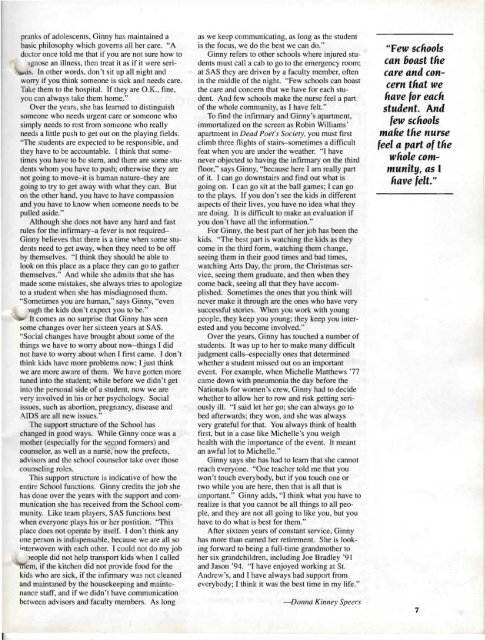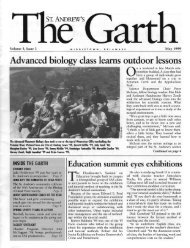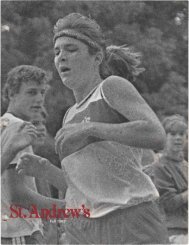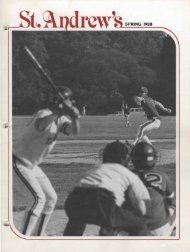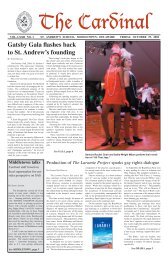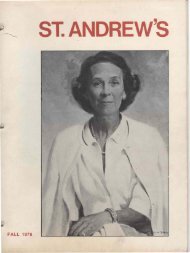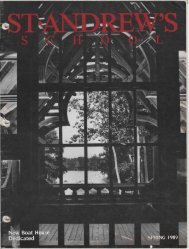Alumni - Saint Andrew's School Archive - St. Andrew's School
Alumni - Saint Andrew's School Archive - St. Andrew's School
Alumni - Saint Andrew's School Archive - St. Andrew's School
- No tags were found...
You also want an ePaper? Increase the reach of your titles
YUMPU automatically turns print PDFs into web optimized ePapers that Google loves.
pranks of adolescents, Ginny has maintained abasic philosophy which governs all her care. "Adoctor once told me that if you are not sure how to.agnose an illness, then treat it as if it were seris.In other words, don't sit up all night andworry if you think someone is sick and needs care.Take them to the hospital. If they are O.K., fine,you can always take them home."Over the years, she has learned to distinguishsomeone who needs urgent care or someone whosimply needs to rest from someone who reallyneeds a little push to get out on the playing fields."The students are expected to be responsible, andthey have to be accountable. I think that sometimesyou have to be stem, and there are some studentswhom you have to push; otherwise they arenot going to move-it is human nature-they aregoing to try to get away with what they can. Buton the other hand. you have to have compassionand you have to know when someone needs to bepulled aside."Although she does not have any hard and fastrules for the infirmary-a fever is not requiredGinny believes that there is a time when some studentsneed to get away, when they need to be offby themselves. "I think they should be able tolook on this place as a place they can go to gatherthemselves." And while she admits that she hasmade some mistakes, she always tries to apologizeto a student when she has misdiagnosed them."Sometimes you are human," says Ginny, "even)ugh the kids don't expect you to be."It comes as no surprise that Ginny has seensome changes over her sixteen years at SAS."Social changes have brought about some of thethings we have to worry about now-things I didnot have to worry about when I first came. I don'tthink kids have more problems now; I just thinkwe are more aware of them. We have gotten moretuned into the student; while before we didn't getinto the personal side of a student, now we arevery involved in his or her psychology. Socialissues, such as abortion, pregnancy, disease andAIDS are all new issues."The support structure of the <strong>School</strong> haschanged in good ways. While Ginny once was amother (especially for the second formers) andcounselor, as well as a nurse, now the prefects,advisors and the school counselor take over thosecounseling roles.This support structure is indicative of how theentire <strong>School</strong> functions. Ginny credits the job shehas done over the years with the support and communicationshe has received from the <strong>School</strong> community.Like team players, SAS functions bestwhen everyone plays his or her postition. "Thisplace does not operate by itself. I don't think anyone person is indispensable, because we are all sointerwoven with each other. I could not do my jobJeople did not help transport kids'when I calledem, if the kitchen did not provide food for thekids who are sick, if the infirmary was not cleanedand maintaned by the housekeeping and maintenancestaff, and if we didn't have communicationbetween advisors and faculty members. As longas we keep communicating, as long as the studentis the focus, we do the best we can do."Ginny refers to other schools where injured studentsmust call a cab to go to the emergency room;at SAS they are driven by a faculty member, oftenin the middle of the night. "Few schools can boastthe care and concern that we have for each student.And few schools make the nurse feel a partof the whole community, as I have felt."To find the infirmary and Ginny's apartment,immortalized on the screen as Robin Williams'apartment in Dead Poet's Society, you must firstclimb three flights of stairs-sometimes a difficultfeat when you are under the weather. "I havenever objected to having the infirmary on the thirdfloor," says Ginny, "because here I am really partof it. I can go downstairs and find out what isgoing on. I can go sit at the ball games; I can goto the plays. If you don't see the kids in differentaspects of their lives, you have no idea what theyare doing. It is difficult to make an evaluation ifyou don't have all the information."For Ginny, the best part of her job has been thekids. "The best part is watching the kids as theycome in the third form, watching them change,seeing them in their good times and bad times,watching Arts Day, the prom, the Christmas service,seeing them graduate, and then when theycome back, seeing all that they have accomplished.Sometimes the ones that you think willnever make it through are the ones who have verysuccessful stories. When you work with youngpeople, they keep you young; they keep you interestedand you become involved."Over the years, Ginny has touched a number ofstudents. It was up to her to make many difficultjudgment calls-especially ones that determinedwhether a student missed out on an importantevent. For example, when Michelle Matthews '77came down with pneumonia the day before theNationals for women's crew, Ginny had to decidewhether to allow her to row and risk getting seriouslyill. "I said let her go; she can always go tobed afterwards; they won, and she was alwaysvery grateful for that. You always think of healthfirst, but in a case like Michelle's you weighhealth with the importance of the event. It meantan awful lot to Michelle."Ginny says she has had to learn that she cannotreach everyone. "One teacher told me that youwon't touch everybody, but if you touch one ortwo while you are here, then that is all that isimportant." Ginny adds, "I think what you have torealize is that you cannot be all things to all people,and they are not all going to like you, but youhave to do what is best for them."After sixteen years of constant service, Ginnyhas more than earned her retirement. She is lookingforward to being a full-time grandmother toher six grandchildren, including Joe Bradley '91and Jason '94. "I have enjoyed working at <strong>St</strong>.<strong>Andrew's</strong>, and I have always had support fromeverybody; I think it was the best time in my life."-Donna Kinney Speers"Few schoolscan boast thecare and con~cern that wehave for eachstudent. Andfew schoolsmake the nursefeel a part of thewhole com~munity, as Ihave felt."7


